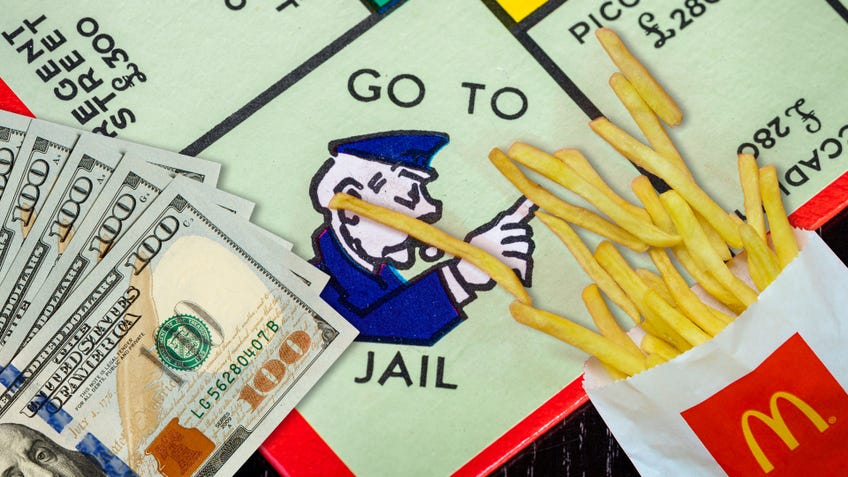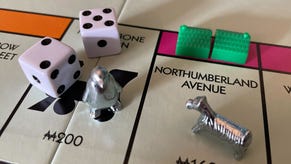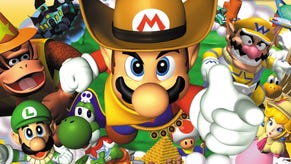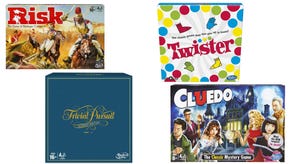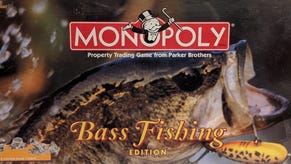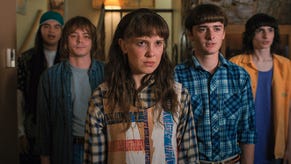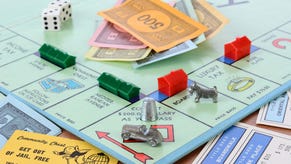How did McDonald’s, Monopoly and the US Mafia get tangled up in scandal?
Fraud and a McFlurry, please.
Between the 1990s and 2000s, the US version of the McDonald's Monopoly prize draw was hijacked by the Mafia. This is a scandal so great that it’s been made into a HBO docu-series, McMillions, as well as a film that’s been in production since 2018. But what exactly happened between McDonald’s, Monopoly and the US Mafia?
McDonald’s Monopoly began in 1987, with customers peeling off the stickers from the side of their McDonald’s food items to reveal either a classic square from the Monopoly board - such as Old Kent Road - or an instant win of usually some kind of food item available at McDonald’s. If players manage to collect three of the same kind of Monopoly square, they win the prize indicated by the square.
You can definitely see the marketing benefit of this tactic for McDonald’s. If people are lucky, they could win a prize. However, in order to win those prizes customers will need to spend much more than they normally would on McDonald’s food, making The Golden Arches a lot of money.
In order to pull off a marketing campaign like this you would need an excellent marketing team. In the 1980s, Simon Marketing was McDonald’s’ choice. Marketing was the driving force behind McDonald’s Monopoly, as well as other themed contests, such as one themed around Who Wants to be a Millionaire? To make sure that all of this was done fairly, it even had a role devoted to looking after the winning stickers - head of security, Jerome P. Jacobson.
As head of security, it was Jacobson’s job to oversee the distribution of the Monopoly stickers, making sure they were spread equally across the US without interference from any untoward parties. However, no-one could have suspected that he was, in fact, the one they should have been watching out for. Jacobson was formerly a police officer in Florida until he left the force due to a wrist injury, it was then that he decided he would move out to Georgia with his wife and start making his way in security. According to a truck driver who worked for Simon Marketing, he appeared to be extremely strict: “He inspected workers' shoes to check they weren't stealing McDonald's stickers.” Despite this, Jacobson had fully set out to make a fool of McDonald’s.
In 1989, Jacobson stole a winning Monopoly sticker worth $25,000 and handed it to his brother. According to court documents (via CNBC), this first sting was just about proving himself. “I don't know if I just wanted to show him I could do something,” Jacobson said. Of course, the head of security wasn’t able to submit those winning stickers, as it would have been way too obvious. The way the security head accrued his money was by taking an upfront payment in return for one of the winning Monopoly stickers.
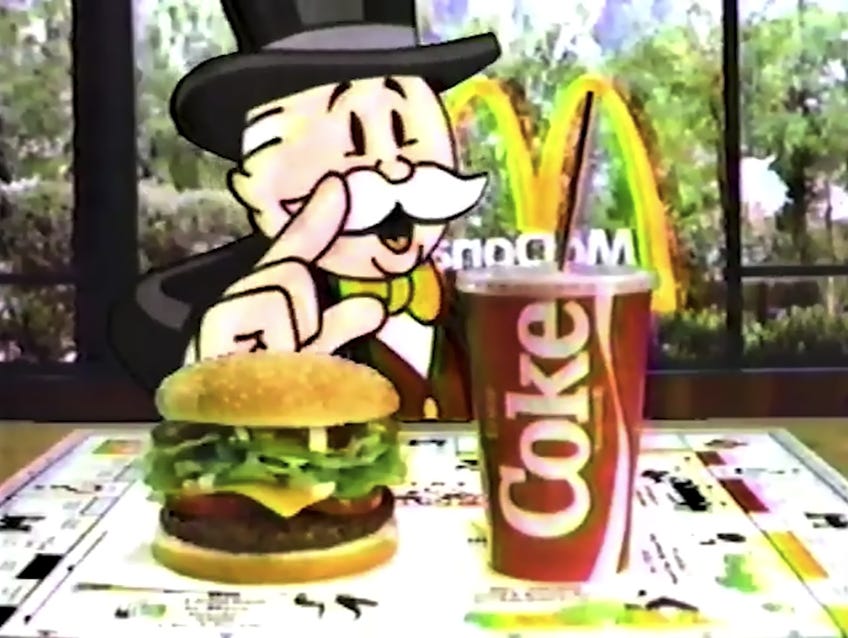
Jacobson’s actions were moderated by an external auditor that didn’t let him out of her sight the entire time. Additionally, he was meant to deliver the winning stickers via cases with tamper-proof seals. So, how exactly did he manage to get winning stickers to the people of his choice? Thanks to a supplier error, the seals meant to keep the winning stickers intact were delivered directly to Jacobson, meaning that all of a sudden he had a way of opening and then sealing the cases containing winning stickers. In order to avoid his auditor, Jacobson went to the men’s bathroom, removed the winning stickers from the case and replaced the original contents of the case with stickers that weren’t prize winners. He was then able to reseal the case with his own supply of seals, making it look as though it had been untouched. Following that, he and the auditor would then continue to make their way to the McDonald’s packaging centre.
It was then up to Jacobson’s friends and family to enlist people they trusted to ‘win’ the prizes, paying tens of thousands of dollars to walk away with them. Jacobson would exchange stickers that were worth $200,000 with people he knew for $45,000, including his own nephew. Eventually, he had built up a network of people who were involved but they were told they couldn’t claim the prizes themselves, spreading them to different states so as not to arouse suspicion.
Though Jacobson had taken great care with instructing his network of people handing out the winning stickers across the United States, the FBI began to notice patterns. In 2000, it received an anonymous tip concerning a $1 million winner William Fisher, who was the father-in-law of one of Jacobson’s connections in Atlanta. Despite the fact that Fisher went to New Hampshire to claim his prize, the authorities were still easily able to trace him back to Jacksonville, Florida. As the FBI looked into the case, it started seeing a large number of winners of the McDonald’s Monopoly were curiously clustered both in Georgia and Florida. Georgia being the state in which Jacobson lived and Florida being where he had worked as a police officer. As of the launch of yet another McDonald’s’ Monopoly competition loomed in 2001, the FBI had wiretaps on recent winners as well as Jacobson, all of whom were living in clusters in Florida and Georgia.
Jacobson was eventually arrested along with seven of his accomplices, all of whom were charged with felony conspiracy to commit mail fraud. However, that was just the beginning of the convictions. Soon, the authorities uncovered at least 50 people who were involved in the scam.
After confessing to all nine of his charges, Jacobson said that he stole up to 60 winning game stickers, charging between $45,000 and $50,000 for each one - allowing him to take home at least $3 million. He was ultimately sentenced to 37 months in prison and was forced to pay over $12.5 million in restitution.
These arrests were a win for the FBI, but resulted in major backlash for both McDonald’s and Simon Marketing. To distance itself from the scam, McDonald’s not only launched a legitimate $10 million cash giveaway, but also cut all ties with Marketing immediately - which then led to both companies suing one another for breach of contract. Marketing won the court battle, but ultimately couldn’t come back from the terrible image it was now sporting thanks to Jacobson - eventually liquidating the company in 2002.
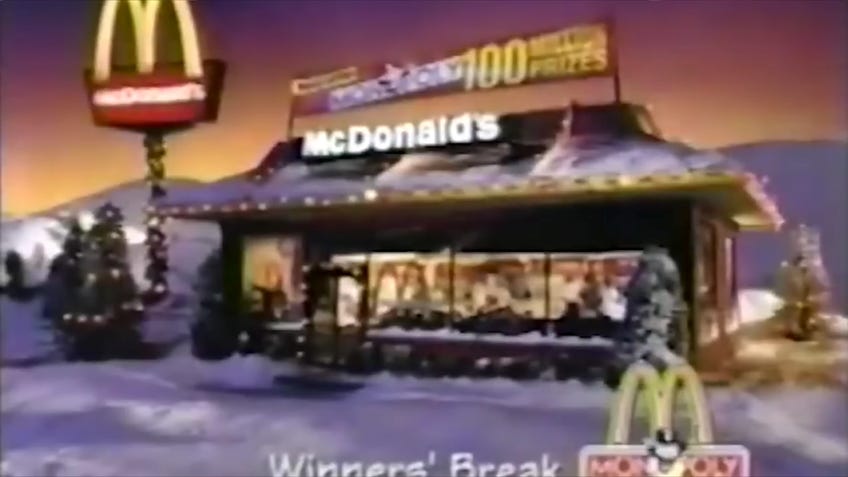
There happened to be some rather unsavoury characters involved in Jacobson’s fraud network. Some of whom were allegedly members of the US Mafia. One of which included Gennaro Colombo, who was the owner of an underground gambling ring and may have been linked to the mob. Colombo had given Jacobson ties to even more interesting characters who, according to Ranker, included “mobsters, psychics, strip club owners, convicts, drug traffickers and even a family of Mormons".
Jacobson alleged that he was fighting back against a system that was already corrupt, claiming that he became disillusioned with the game when he discovered that Simon Marketing had declined to allow prize-winning stickers to be printed in Canada. The company said that it wanted to keep the competition within the United States. Jacobson is quoted as saying: "I knew what we were doing in Canada was wrong. Sooner or later, somebody was going to be asking questions about why there were no winners in Canada."
On November 12th 1995, St. Jude Children’s Research Hospital received a winning sticker that was worth $1 million. McDonald’s did eventually award the money to the hospital, but Jacobson claims that he was feeling philanthropic and had sent this winning sticker to the hospital anonymously. Investigators have stated that they believe he only sent it to the hospital as a last-ditch solution because no-one had paid him for the ticket. He had hoped that this revelation would make his sentencing a little more lenient, but it didn’t.
According to the Radio Times, some of the fake winners were interviewed for the McMillions docuseries - and not all of them were the heinous criminals you might imagine. For example, a few people were seemingly in over their heads and looking for some kind financial relief. Gloria Brown, a single mother from Jacksonville, and George Chandler, a single father from South Carolina, didn’t know what they were getting into according to one of the directors of McMillions, James Lee Hernandez.
“You can look at it as black-and-white; there's the FBI and there's criminals, and criminals get what they deserve,” Hernandez said. “But when you look underneath the hood you see that really these are good people who just made bad decisions. Every single person in their life has made at least one decision - probably once a week - that they regret and most of the time it doesn't lead to being a federal criminal.”
This scandal has not been covered as extensively as you might expect. The trial against Jacobson and his accomplices started on September 10th 2001, just a day before 9/11. A lot of people say that the coverage of the trial suffered due to the fact that this tragic attack was, rightfully, the media’s main focus at the time.
